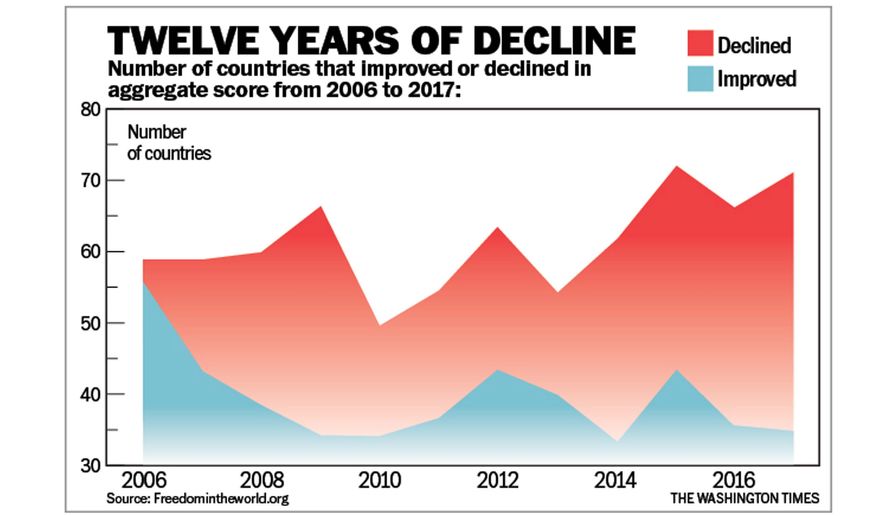OPINION:
The annual worldwide assessment of democracy by Freedom House is a sobering kick-in-the-pants to remind us just how many people live without basic human rights, political freedom or the right to simply speak what’s on their mind.
It’s also a reality check on how the world responds to the scourge of authoritarianism or gins up charges of repression when the facts aren’t there to support the evidence.
The non-governmental organization presented their latest findings on a color-coded interactive map that showed Israel as a tiny speck of green — indicating a free country — in a Middle East sea of repressive purple, indicating a country that’s not free, with dashes of yellow, code for a country that’s only partly free.
Somebody should alert the U.N. Human Rights Council and Roger Waters.
Let’s see, after all, how much the most vocal anti-Israel entities pursue the Jewish State’s neighbors for their very real human rights violations.
On the Freedom House scale of 0 to 100, with the rock-bottom score being the least free, Syria’s Bashar Assad accomplished the ignominious feat of earning minus-one. Saudi Arabia, a member of the U.N. Human Rights Council, scored a grand 7 points out of 100 possible on political rights and civil liberties. At the bottom of the Arabian Peninsula, war-torn Yemen score 13 out of 100 points while Oman came in at 23 points.
Jordan and Lebanon ranked as the only “partly free” countries in the neighborhood, scoring 37 and 43 out of 100, respectively. Heading down the length of the Red Sea, Egypt registered as not free with 26 points, Sudan aimed for the bottom with only 8 points, Eritrea earned a dismal 3 points, Ethiopia got just 12 points, and Djibouti tied with Egypt, scoring 26 out of 100.
Unfortunately, but also fittingly, Turkey dove into the anti-democratic doldrums by dipping from “partly free” the previous year to “not free” this year.
Freedom House explained that Turkey shaved points off their political freedom and civil liberties scores “due to a deeply flawed constitutional referendum that centralized power in the presidency, the mass replacement of elected mayors with government appointees, arbitrary prosecutions of rights activists and other perceived enemies of the state, and continued purges of state employees, all of which have left citizens hesitant to express their views on sensitive topics.”
Since the July 2016 coup attempt, nearly 132,000 Turks deemed political foes of the ruling party have been detained and 64,000 arrested. As of this past fall, those detention stats included nearly 700 children under the age of 6. More than 3,000 schools have been shut down by the Turkish government, 317 journalists have been arrested, and 189 media outlets have been forcibly closed.
The Turkish government, in the words of Freedom House, has “shown growing contempt for political rights and civil liberties in recent years, perpetrating serious abuses in areas including minority rights, free expression, associational rights, corruption, and the rule of law.”
And yet Turkish President Recep Tayyip Erdogan, underscoring how the truly guilty project onto others, is fond of screaming at Israel that they’re oppressive and violating human rights.
“Jerusalem is the apple of our eye. We will not abandon it to the child-murderer state. We will not abandon it to an occupier state,” Mr. Erdogan howled in an address last month. “We will continue our struggle within law and democracy.”
He’d better check his freedom score before climbing any higher on that soapbox, as Turks dream of one day living under rule of law and democracy.
Meanwhile, Freedom House gave Israel 79 out of 100 points as a free country, with the highest possible ranking in the area of political rights.
That’s where having a multiparty democracy with free and fair elections and guaranteed rights for minorities gets you. And that means little at the United Nations, where being a Jewish State means getting slammed with a barrage of biased resolutions and being a rights-violating nation will probably land you a seat on the Human Rights Council.
• Bridget Johnson is a senior fellow with the news and public policy group Haym Salomon Center and D.C. bureau chief for PJ Media.




Please read our comment policy before commenting.